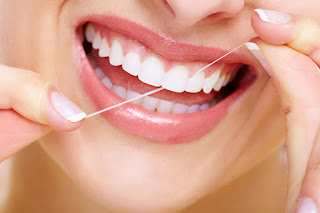Having gum recession can be frustrating, aesthetically unpleasant,
and detrimental to your oral health. If you have started noticing signs
of gum recession, or you just want to ensure that it never develops, we
have some tips that might be helpful for you to begin utilizing.
• Visit the dentist.
It
may sound like an obvious solution, but many people avoid visiting the
dentist on a regular basis. This prevents them from realizing when they
may be at risk for gum recession. When you visit a dentist for an
appointment, we can notify you if we notice any signs of recession or
gum disease. We can also direct you to changes that need to be made to
your oral hygiene regimen. This can be invaluable information when you
are trying to prevent detrimental and unsightly gum recession.
• Adjust your brushing habits.
When
you use a toothbrush that is too hard or puts too much pressure on your
teeth and gums when you brush, you are weakening your oral tissues.
Aggressive brushing habits may seem like a good idea to deter plaque
from developing, but they are actually making your teeth and gums more
vulnerable to other problems like gum recession and tooth loss. Brush
your teeth with a firm, but gentle pressure and circular motion. If you
have been using a toothbrush with hard bristles, you may also consider
getting medium or soft grade bristles.
• Over flossing may be the culprit.
Flossing
is a wonderful habit to have, but when you over floss, you could be
weakening your gums. Flossing removes plaque, but once you have flossed
once or twice a day, you should avoid doing so anymore unless you have
something stuck in your teeth. Flossing too much puts unnecessary
pressure on your gums and may encourage them to recede.
• It may be in your genes.
Unfortunately,
you may just have an inherited predisposition for thin gums and gum
recession. If this is the case, you should definitely be brushing more
gently, and you should consider having a gum graft before your gum
recession becomes severe.
• Biting your nails, pencils, or any other foreign objects.
If
you have the habit of putting objects into your mouth to chew on, you
may also be scratching your gums without noticing. You should already be
trying to stop these biting habits as they are bad for your dental
enamel, but they can also lead to gum recession.
• Periodontal disease could be to blame.
Periodontal
disease, a severe form of gum disease, is the main culprit of gum
recession. To avoid developing periodontal disease, practice proper oral
hygiene and visit a dentist at least twice a year for check-ups and
cleanings.
Once you form these habits, you should be on the road
to better oral health and less likelihood of developing gum recession.
Also, keep in mind that you should visit your dentist every 3-6 months
if you think your gums may already be receding. A dentist will be able
to keep an eye on the amount of gum tissue you are losing. We can also
perform a gum graft as needed and help with extreme cases of gum
recession.
